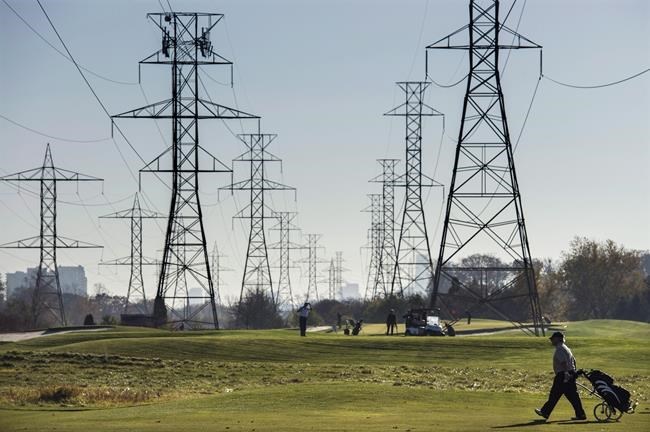TORONTO — Ontario's electricity system operator is bringing seven new battery storage projects into the province's grid to support reliability and help eventually move away from natural gas.
But in the meantime, the Independent Electricity System Operator also announced more natural gas generation, from expansions and upgrades at existing sites.
Ontario can eliminate natural gas in the electricity system by 2050, but it is still needed for now to maintain reliability, the IESO said.
"Natural gas plays an important role as a transitional resource," said Chuck Farmer, the IESO's vice-president of planning, conservation and resource adequacy.
"Natural gas facilities are available to us 24/7. They are able to dispatch and they are able to run for extended periods of time should the system be in severe need. It is critical for its operational characteristics and extremely necessary on the peak days of the year or when we lose certain types of generation unexpectedly."
The IESO is planning to phase out natural gas generation, having it available as a backup after 2035, Farmer said.
The electricity operator has said the amount of new natural gas Ontario needs in the next few years is expected to increase greenhouse-gas emissions by two to four per cent. It means emissions from the electricity sector are set to rise to support the economy's broader electrification in the name of reducing emissions.
Net reductions from the proliferation of electric vehicles are expected to offset emissions from electricity generation by 2038, the IESO has said.
The system operator said in the fall that Ontario should secure 4,000 more megawatts of capacity in the system — enough to power the city of Toronto — as it faces surging electricity demand and a large nuclear plant is set to come offline.
Tuesday's announcement amounts to 1,325 of those 4,000 megawatts — 739 megawatts from battery storage and 586 from natural gas. The IESO said there are several other storage projects in the works, for up to a potential total of 2,500 megawatts of storage.
Battery storage facilities can charge during off-peak hours then inject electricity back into the system at times of peak demand.
NDP energy critic Peter Tabuns said the seven new battery storage facilities are welcome news, but he is "deeply concerned" about increasing reliance on natural gas.
"While the entire world moves towards greener and more sustainable energy sources, Ontario’s expected decision to increase (reliance on) gas-fired power plants undermines plans to reduce greenhouse-gas emissions — further demonstrating the Conservatives' lack of commitment to meaningful climate action," he wrote in a statement.
Environmental groups such as the Ontario Clean Air Alliance and Environmental Defence said renewable sources of power are both cleaner and cheaper.
"While natural gas prices have skyrocketed in the last year and will remain volatile, wind and solar are now the cheapest form of new electricity generation and offer lower rates for the consumer," Lana Goldberg, the Ontario climate program manager at Environmental Defence wrote in a statement.
Ontario Energy Minister Todd Smith said the competitive nature of the procurement ensured cost-effective rates.
"This morning's announcement by the IESO actually proves that this is working, it's a better way to ensure that we have the assets that we need going forward, compared to the sole-sourced deals that we saw under the previous Liberal government," he said.
"So I'm really happy with the way that this request for proposals and competitive procurement has worked out. We're getting a lot of new clean generation for our province, making sure that the system works more efficiently."
This report by The Canadian Press was first published May 16, 2023.
Allison Jones, The Canadian Press

